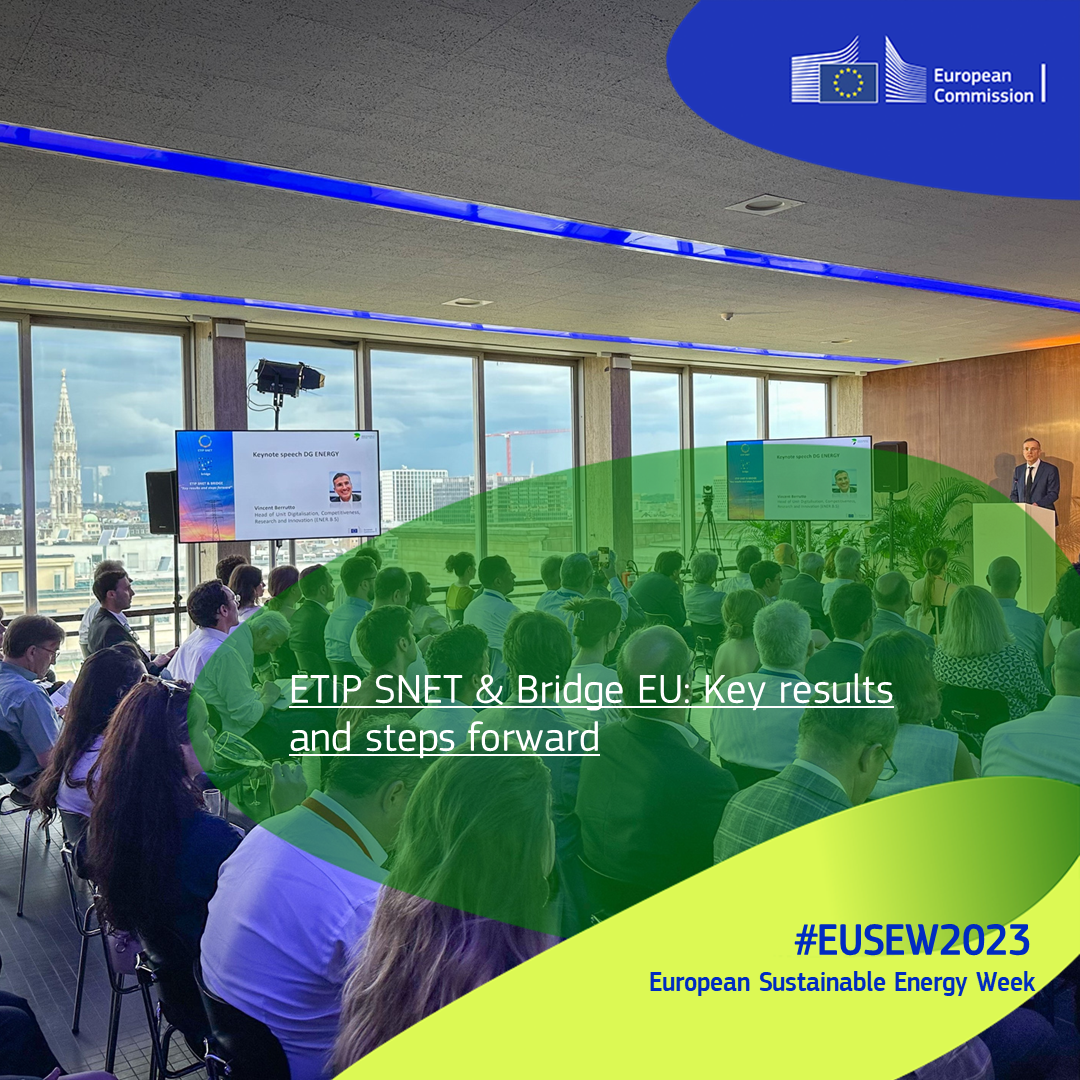
On Tuesday 20 June 2023 in Brussels, the ETIP SNET and BRIDGE Key Results and Steps Forward event showcased the role of the two EC initiatives in promoting smart energy systems research and innovation.
Watch the recordingof the event.
Smart grids are at the forefront of the energy transition, playing a leading role in the shift towards cleaner and more sustainable energy sources. They enable the seamless integration of renewable energy into our power grid, making it more efficient and effective. Using advanced digital technologies, smart grids manage the flow of electricity and information between power generators, consumers/prosumers, and the grid itself. This brings numerous benefits, including reducing greenhouse gas emissions, promoting the use of electric vehicles and smart homes, and even lowering consumer bills. By embracing smart grids, we can create a resilient energy system that supports a greener future for all.
This has been the cornerstone of the ETIP SNET and BRIDGE – Key Results and Steps Forward event that Brussels witnessed on 20 June 2023, where the two European Commission's initiatives at the forefront of Smart energy systems research and innovation (R&I) showcased their progress and prospects. The event encompassed a presentation and panel discussion with high-level EC officials from CINEA and DG ENER, the ETIP SNET Chairmanship, and the BRIDGE Working Group. Several key stakeholders in the energy field gathered at the event to champion the energy transition. The event was a Sustainable Energy Day within the framework of the European Sustainable Energy Week 2023 (EUSEW).
We are all aware of the challenges we encounter on a daily basis in ensuring the energy transition could become a real historical achievement. We collectively recognise the magnitude of this endeavour and its complexity. By bringing together a multitude of stakeholders and experts from the energy sector, the ETIP SNET assists the EC in identifying R&I priorities to support Europe's energy transition towards low carbon-neutral energy. The Platform fosters extensive collaboration among its various and diverse stakeholders, leading to significant advancements in renewable energy integration, grid optimisation, and innovative energy management systems.
Another fertile soil from where to harvest precious experience and information for a better energy future is the sibling EC initiative BRIDGE, which brings together various Horizon 2020 and Horizon Europe projects in smart grids, energy storage, islands, and digitalisation. BRIDGE pursues a structured approach to address cross-cutting challenges encountered in the project demonstration phase, which may constitute an obstacle to innovation. The initiative is among the most robust pillars at the European Commission's disposal to contribute to the implementation of the roadmaps and actions drawn by the ETIP SNET. It started with 17 projects, now unites 98, and is set to continue expanding.
Throughout the event, speakers outlined that the contributions and scope of the two initiatives continue evolving and serve as a guiding light for our endeavours. Step by step, they help expand our focus to include emerging energy sectors, recognising the ever-increasing importance of integrating renewables and actively involving consumers and prosumers in this transformative process. Nonetheless, while significant progress has been made, much work is still ahead of us.
Only by continuing to collaborate, engage in meaningful dialogue, and foster exchanges among the various stakeholders part of the two initiatives can we effectively address the challenges associated with the energy transition. We must unite the efforts of industries, universities, research centres, and other key players in this journey. Indeed, it is only through collective action and cooperation that we can navigate the complex path toward a sustainable energy future. Here lies the very critical contribution that the two EC initiatives can give.
We must remain committed to ongoing collaboration, open dialogue, and knowledge sharing as we forge ahead, driven by a shared vision of achieving a successful energy transition. Together, we can overcome obstacles and create a positive impact that will benefit present and future generations.
< Back to all news

